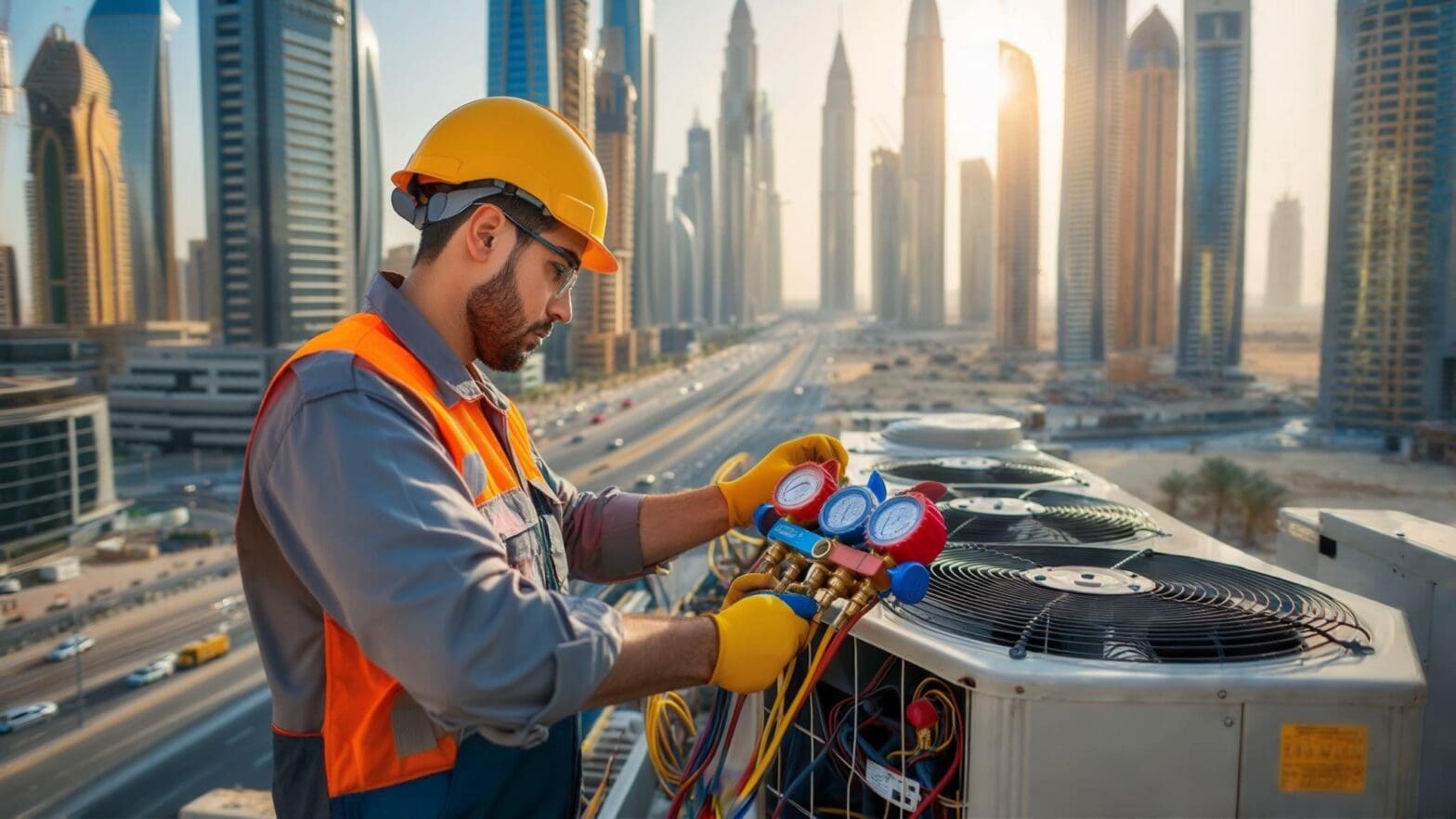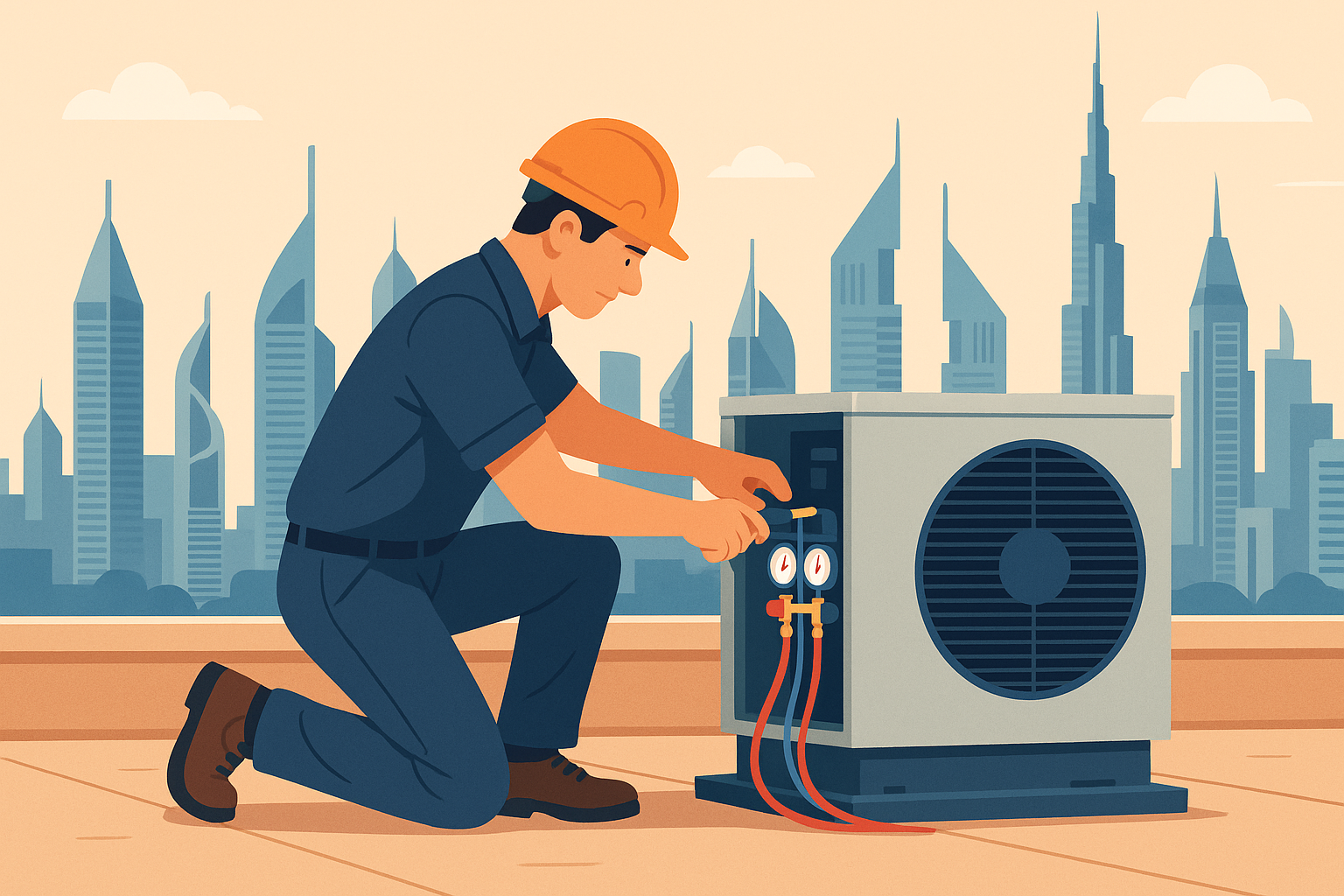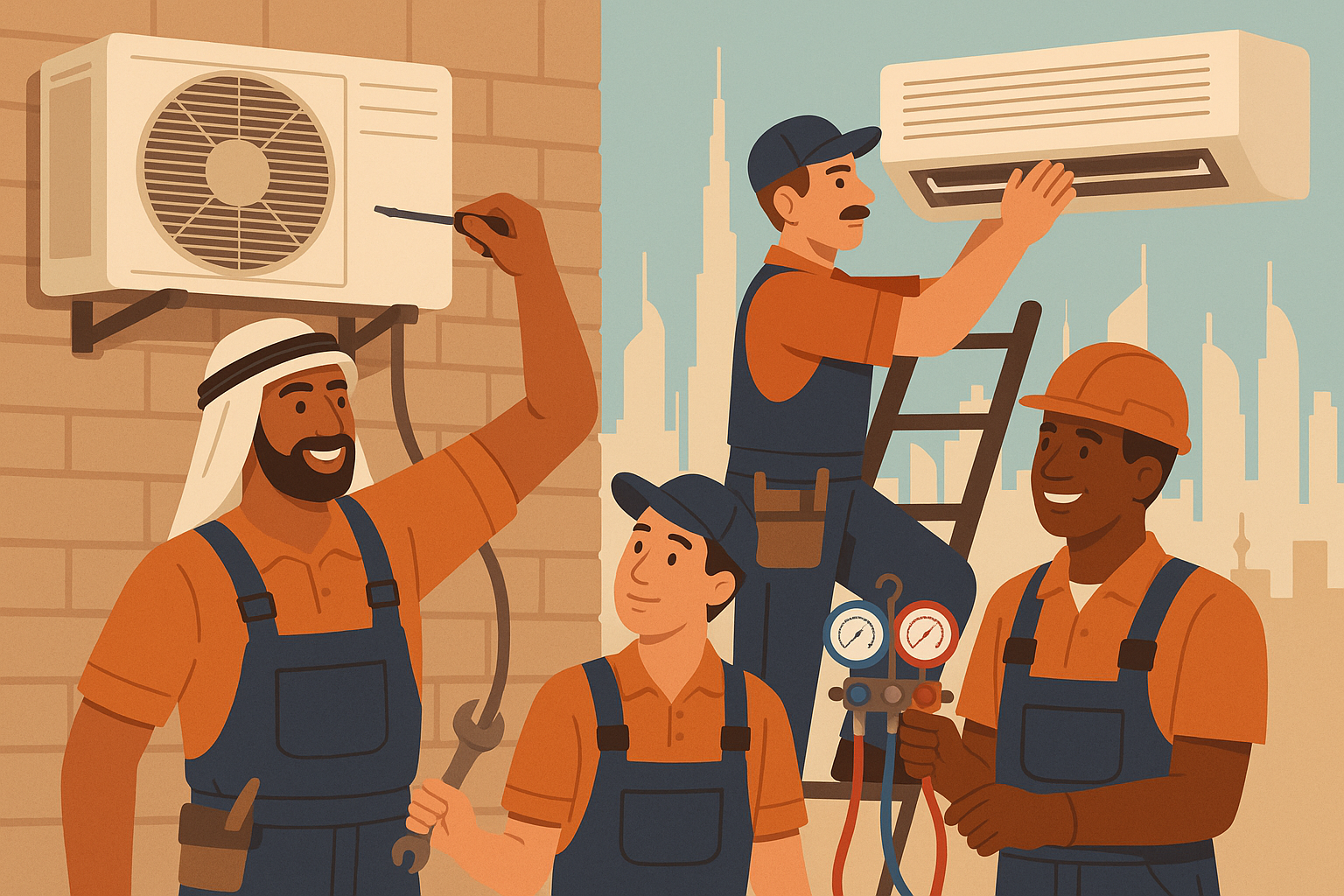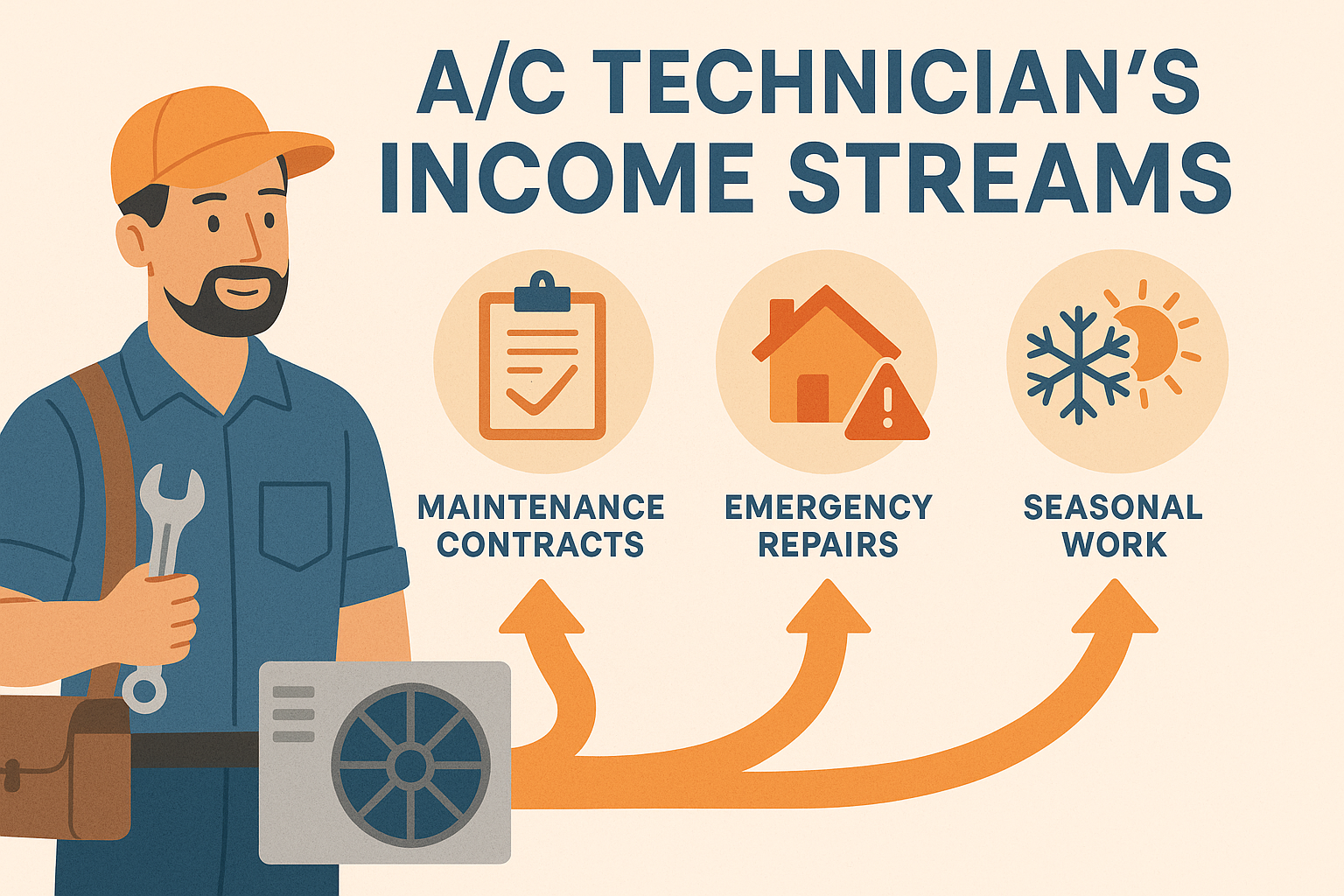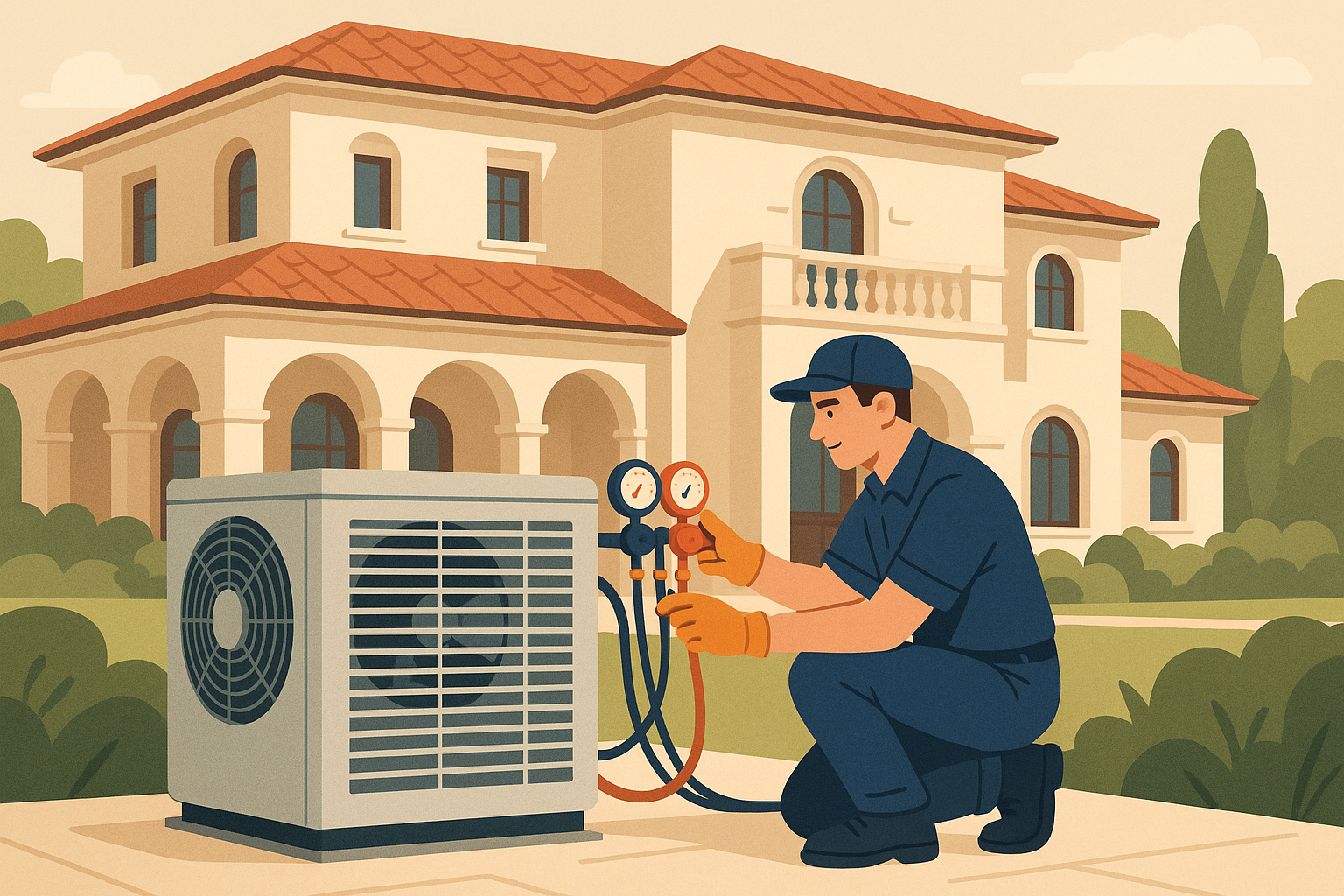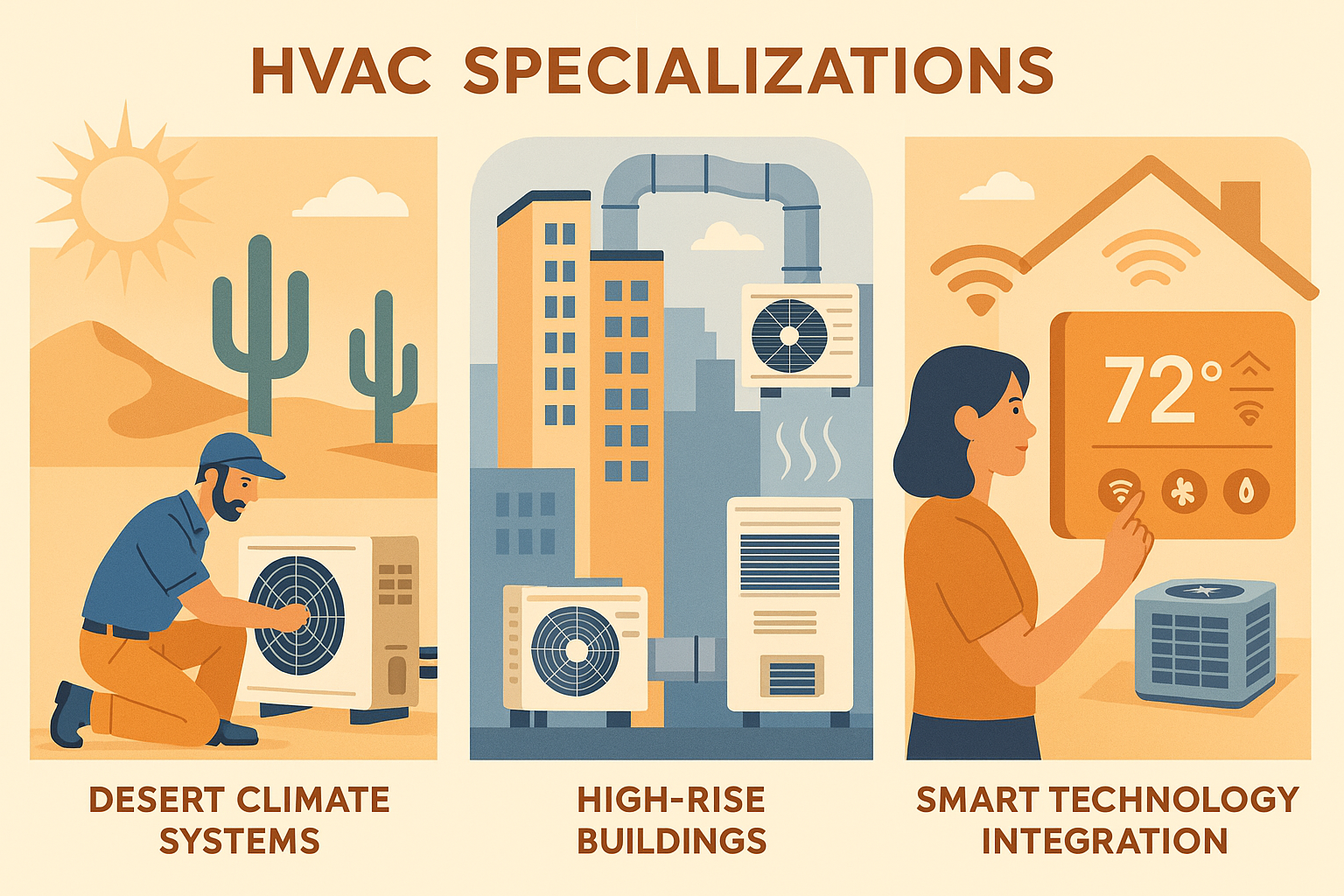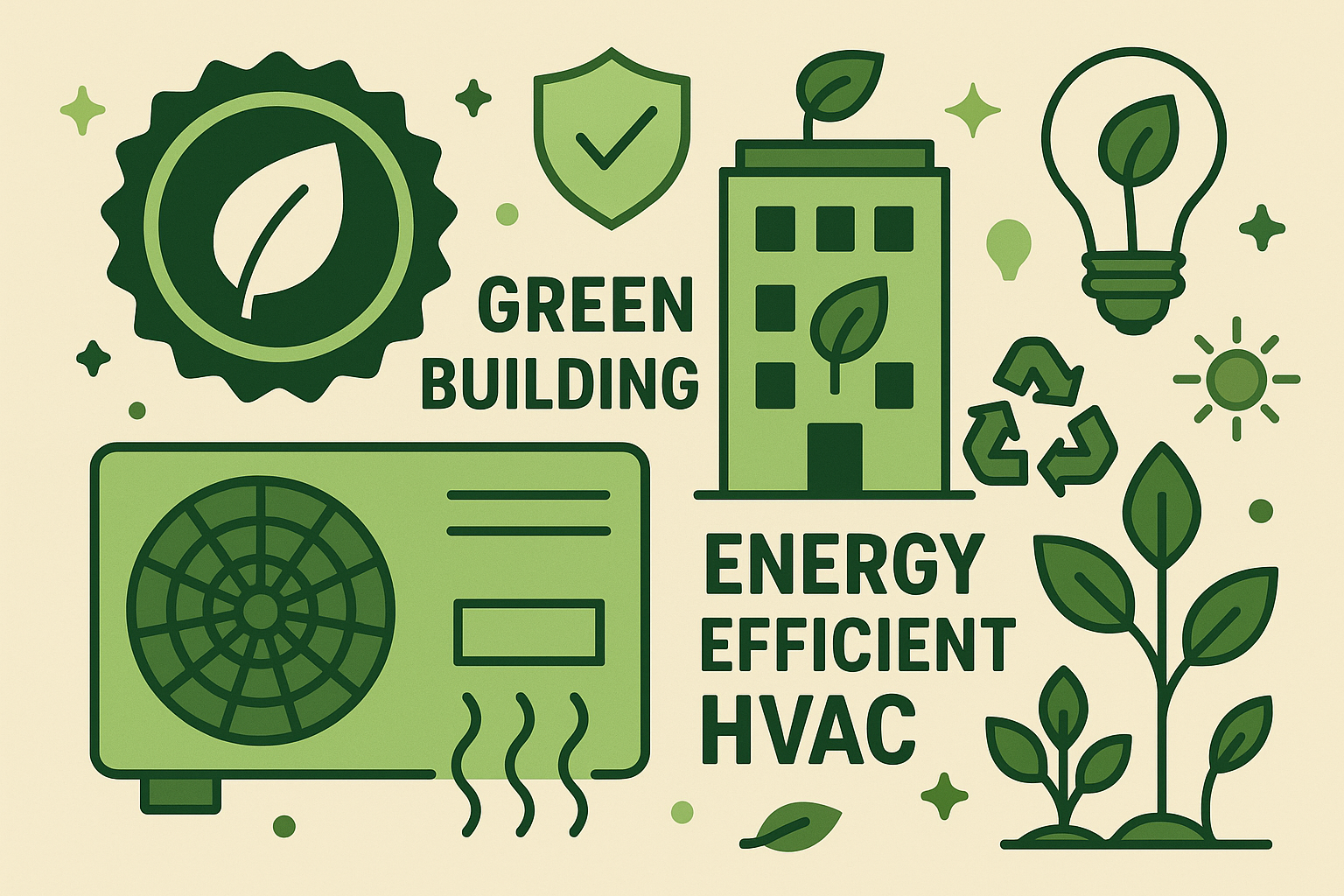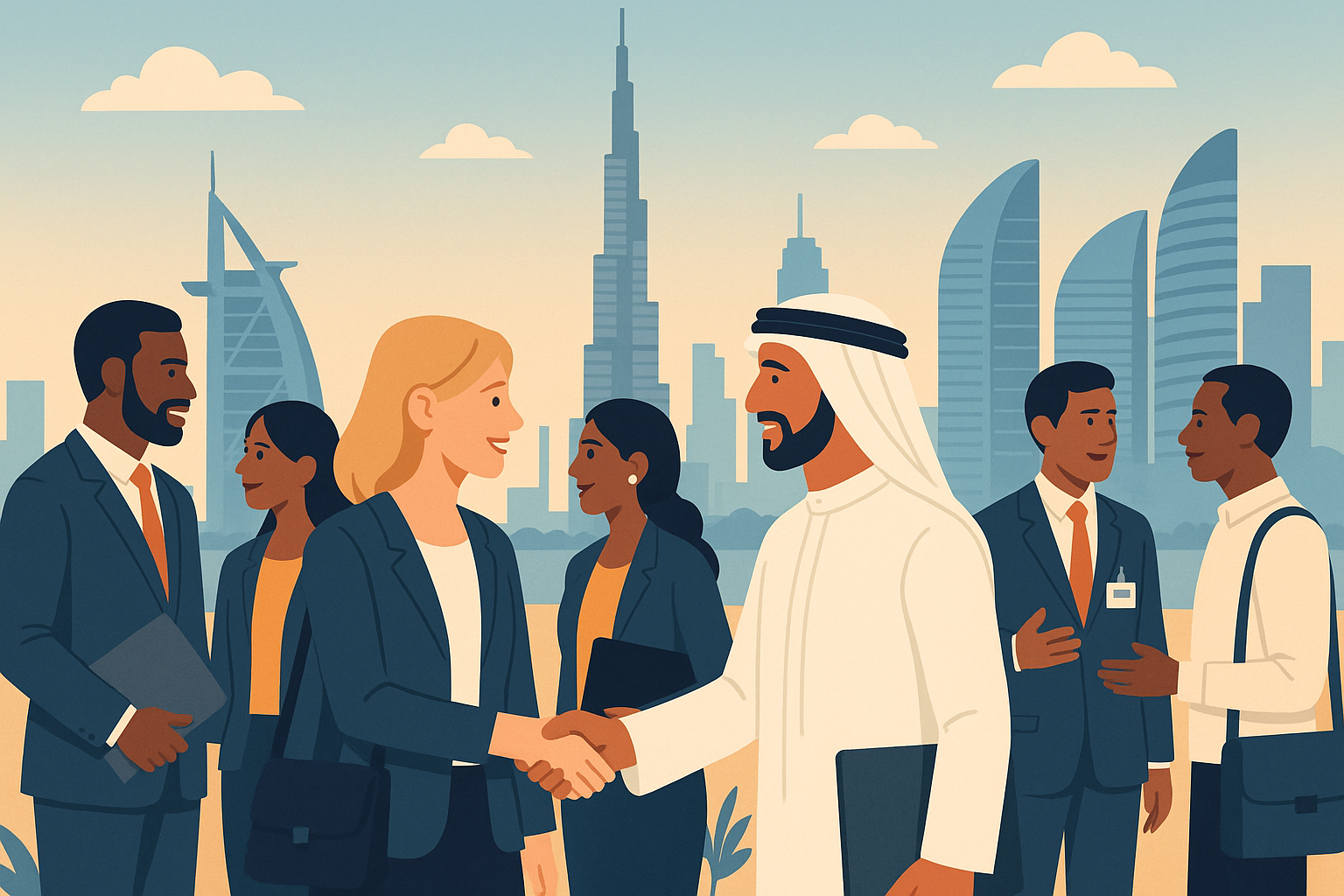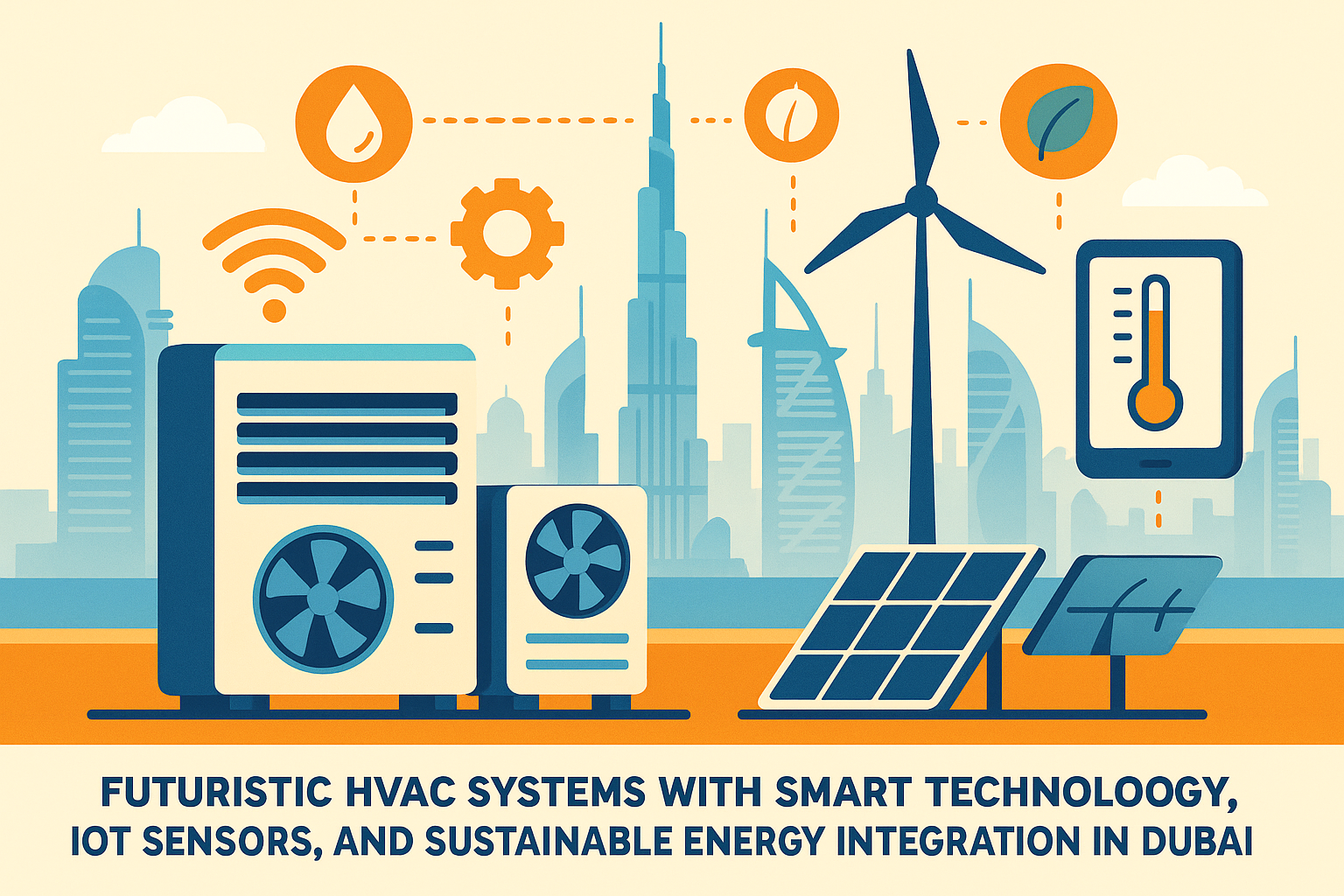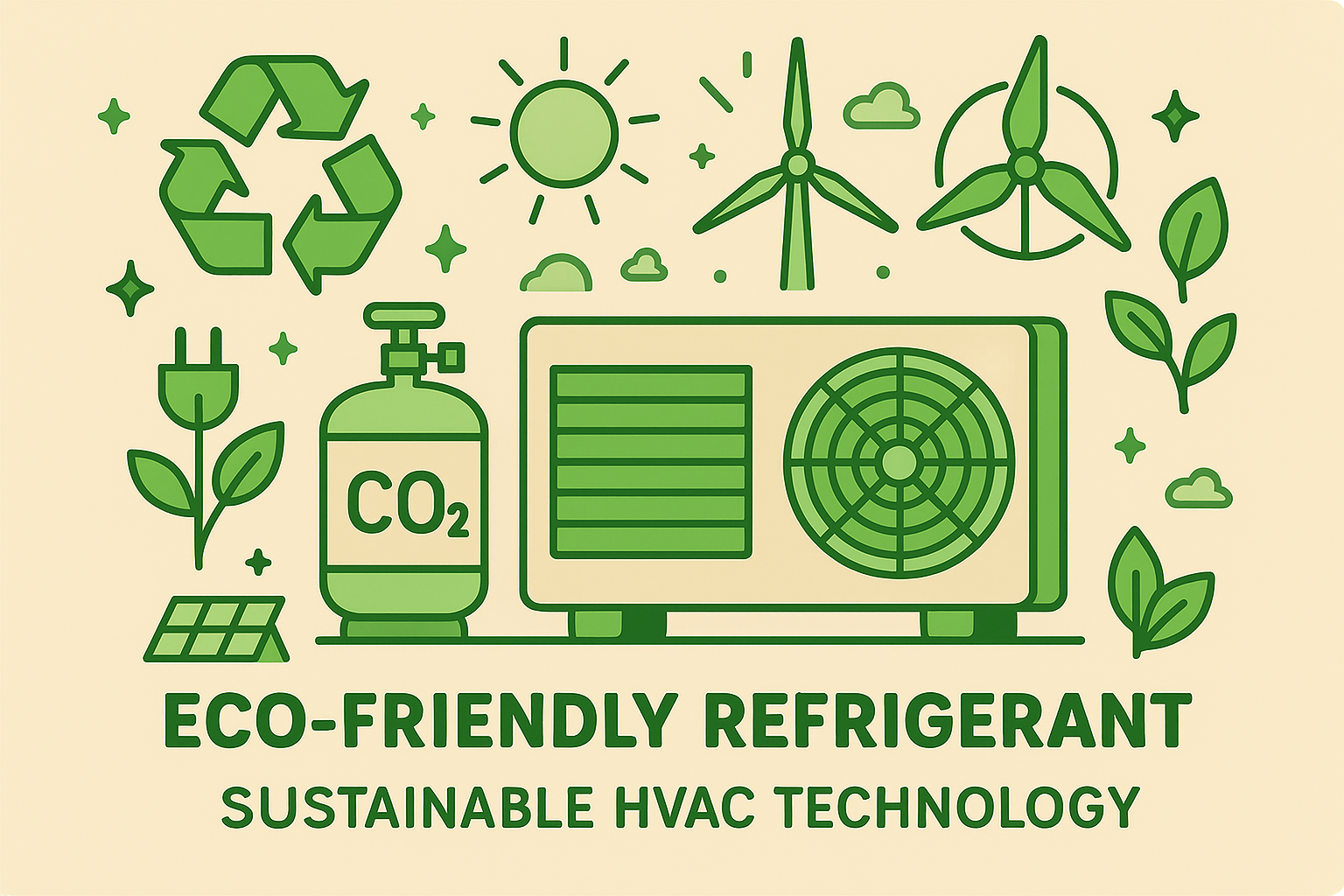The official statistics tell you that AC technicians in Dubai earn around AED 169,127 annually according to SalaryExpert, but that’s just part of the story. What these surveys miss is the cash payments, seasonal rushes, and specialized work that can seriously boost your earnings beyond what’s on paper.
I’ve been working in Dubai’s HVAC market for over eight years, and I can tell you that the ac technician salary in dubai you see in job postings is just the starting point. This isn’t about getting by on a basic salary – it’s about understanding how things really work here and what separates technicians who struggle from those making good money in one of the world’s most demanding HVAC markets.
Table of Contents
-
The Reality Behind Salary Differences: How Your Background Affects Your Pay
-
The Cash Economy: Side Work and What You Need to Know
-
Skills That Actually Pay: What’s Worth Learning in Dubai
-
How to Navigate Dubai’s Business Culture for Better Pay
-
Future-Proofing Your Career: What’s Coming Next
TL;DR
-
Where you’re from often affects your earning potential more than your technical skills – it’s not fair, but it’s reality
-
Western technicians can earn 40-60% more by positioning themselves as energy efficiency specialists
-
The pre-Ramadan period creates massive demand spikes – your biggest earning opportunity of the year
-
Villa maintenance and after-hours commercial work can double your official salary through cash payments
-
Desert climate know-how and high-rise building experience command the highest pay premiums
-
Smart city tech and green building requirements are creating new high-paying opportunities
-
Relationships (wasta) often matter more than formal applications for the best jobs
The Reality Behind Salary Differences: How Your Background Affects Your Pay
Here’s something I wish someone had told me when I first arrived: where you’re from creates invisible salary limits and opportunities in Dubai’s AC market. It’s not about your skills or experience – it’s about perceptions that have been built up over years.
I’ve seen this play out countless times. Last month, I met two guys at a job site – both had the same Daikin certification, both worked on identical villa systems. The difference? One was from Germany and charging AED 200/hour for villa work, while the other (from Pakistan) was making AED 80/hour doing the exact same repairs. Both were excellent technicians. It’s not fair, but it’s the reality you’re working with.
The numbers back this up. According to PayScale, early career AC technicians with 1-4 years of experience earn an average total compensation of AED 2,738, while mid-career technicians with 5-9 years earn AED 21,800 – showing how experience levels impact pay regardless of where you’re from.
When you’re moving internationally for work, having proper documentation becomes crucial. Many technicians find they need help with replacing diplomas and transcripts that got damaged or lost during the move to Dubai.
How Different Backgrounds Navigate the Market
The market basically sorts technicians into different groups based on nationality, creating separate salary ranges regardless of what you actually know. Each group has to work within their segment to maximize earnings.
Your background determines which doors open easily and which stay locked. But here’s what most people don’t realize – you can work within this system to make good money no matter where you’re from.
|
Background |
Typical Monthly Range (AED) |
How to Get Better Pay |
Main Advantages |
|---|---|---|---|
|
Western (EU/US/Canada) |
15,000 – 25,000 |
Position as energy consultant |
Perceived expertise, luxury market access |
|
Asian (India/Philippines/Pakistan) |
3,500 – 8,000 |
Specialize in technical niches |
Strong networks, cost efficiency |
|
Arab (Non-UAE) |
5,000 – 12,000 |
Bridge cultural gaps |
Language skills, regional understanding |
|
Emirati |
8,000 – 18,000 |
Fast-track to management |
Government support, local connections |
If You’re from Europe or North America
You’ve got built-in advantages that most people waste. I’ve watched Western technicians double their income simply by changing how they present themselves to clients.
Instead of calling yourself an “AC technician,” try “Energy Efficiency Consultant.” It’s the same work, but villa owners and commercial clients see it differently. Focus on saving them money through better system efficiency rather than just fixing what’s broken.
Here’s what actually works:
-
Get certified in green HVAC tech (LEED, Energy Star)
-
Target luxury residential projects in Dubai Marina and Downtown
-
Build a portfolio showing how much money you’ve saved clients
-
Talk about energy savings, not just repairs
If You’re from Asia
Don’t let anyone tell you that your background limits your earning potential. Some of the highest-paid technicians I know are from this region – they just took a different approach than competing on price.
The key is specializing in stuff that other people avoid. Industrial cooling, VRF systems, Building Management Systems – these are areas where your technical skills matter more than perceptions.
Here’s what works:
-
Get manufacturer certifications (Daikin VRV, Mitsubishi Electric)
-
Focus on the big commercial and industrial jobs
-
Learn Building Management Systems integration
-
Use your community networks – they’re incredibly strong here
If You’re Emirati
Being Emirati opens doors that others can’t access, but you need to back it up with real skills. The government programs are there to help, but the market still demands competence.
Ahmed, an Emirati guy I know, started with basic repair skills but used government training programs to get certified in smart building systems. Within three years, he was managing HVAC installations for Dubai’s smart city projects, earning AED 22,000 monthly plus project bonuses. He combined his cultural advantages with genuine expertise.
Here’s the path:
-
Use government-sponsored training programs
-
Aim for supervisory roles early
-
Combine technical skills with business development
-
Leverage your networks for premium project access
Making More Money Through Project Work
Your monthly salary is just the starting point. The real money comes from understanding Dubai’s seasonal patterns and demand cycles. Smart technicians create multiple income streams that can easily double or triple their base earnings.
The Pre-Ramadan Gold Rush
This is when I make more money in two months than some people make all year. Everyone’s scrambling to get their systems ready before the real heat hits and Ramadan begins.
Pre-Ramadan creates a 300% surge in maintenance demand. Businesses want everything perfect before the holy month, and homeowners don’t want AC failures during family gatherings.
How to cash in:
-
Start reaching out to clients in February-March
-
Offer “Ramadan preparation” maintenance packages
-
Partner with facilities management companies for bulk work
-
Create emergency response services with premium pricing
Summer Emergency Response
When it’s 50°C outside and someone’s AC dies, they’ll pay whatever you ask. That’s just the reality of Dubai summers. I know technicians who make AED 500-800 for a single emergency call during peak summer.
How to position yourself:
-
Be available 24/7 during summer months
-
Stock critical spare parts during off-season
-
Have different pricing for different response times
-
Build relationships with property management companies
The Cash Economy: Side Work and What You Need to Know
What the salary surveys don’t tell you is that a huge chunk of money in this business never shows up on paper. Cash payments, weekend work, and private arrangements can easily double your official income if you know how to navigate this world safely.
Half the money in this business flows through informal channels. It’s not illegal, but it requires understanding unwritten rules and social dynamics that nobody teaches you in technical school.
The success stories are real. Muhammad Idrees Alam started as a tea boy earning Dh900 and built AC repair and car wash businesses now generating Dh30,000-40,000 monthly profit. As reported by Khaleej Times, Alam’s AC repair shop in Sharjah employs 12 people and benefits from seasonal demand that creates serious earning opportunities for skilled technicians.
The Villa Circuit
The villa circuit is where the real money is. I know guys making AED 15,000 a month just from weekend villa work – all cash, all word-of-mouth referrals. But getting in isn’t about your certifications – it’s about who trusts you with their home.
Once you’re in, the money flows consistently. These families don’t want a technician – they want a trusted advisor who keeps their home comfortable without them having to think about it.
Getting Started in Villa Work
Access to high-paying villa work depends on referrals, not advertising. You need one satisfied client who’ll vouch for you to their friends and neighbors.
I wasted my first year here trying to advertise villa services online. Got nowhere. Then I did excellent work for one family, asked for referrals, and suddenly had more villa work than I could handle.
Here’s how it actually works:
-
Start with one client and do exceptional work
-
Learn basic Arabic and Hindi greetings
-
Understand different expatriate community preferences
-
Always look professional and show up on time
-
Offer package deals for multiple properties
What Villa Clients Actually Want
Villa clients pay premium rates for peace of mind. They want maintenance scheduled around their travel, emergency response when needed, and detailed reports with photos showing what you did.
These aren’t just service calls – they’re relationships. Remember their kids’ names, understand their schedules, and become the person they call first when anything goes wrong.
Steps that work:
-
Create maintenance schedules that work with family travel
-
Offer seasonal system optimization
-
Provide detailed service reports with photos
-
Build relationships with other home service providers for cross-referrals
Many technicians working Dubai’s premium villa market find that displaying professional certifications properly can significantly impact client trust and willingness to pay premium rates, which is why understanding how to display certificates on wall becomes important for establishing credibility in high-end residential markets.
After-Hours Commercial Work
Businesses hate disrupting operations for maintenance. That’s why they’ll pay double or triple rates for you to work nights and weekends. I’ve built my entire side business around after-hours work – while other technicians are sleeping, I’m making premium rates in empty office buildings.
Commercial buildings need maintenance, but they can’t shut down during business hours. This creates huge opportunities for technicians willing to work odd hours.
Building Your After-Hours Business
Night and weekend commercial work pays 150-200% premium rates because you’re not disrupting business operations. But you need security clearances and relationships with facilities managers to access this market.
Carlos, a Filipino technician I know, built his after-hours business targeting Dubai International Financial Centre buildings. Working 10 PM to 6 AM shifts on weekends, he charges AED 200 per hour compared to his daytime rate of AED 80, earning an additional AED 8,000 monthly while keeping his regular job.
How to get started:
-
Get security clearances for major commercial buildings
-
Build relationships with facilities managers
-
Learn large commercial systems
-
Create standardized after-hours service packages
Skills That Actually Pay: What’s Worth Learning in Dubai
Not all skills pay the same here. I learned this the hard way – spending months on certifications that barely moved my salary, while missing the specializations that could have doubled my income.
Understanding which skills command the highest premiums helps you invest your learning time for maximum financial return. Dubai’s extreme climate and unique building landscape create specific demands where certain specializations pay way more than general AC skills.
Data from PayScale shows that the highest pay for AC technicians reaches AED 56,000 annually, while the lowest is AED 2,000 – highlighting the massive salary range that depends largely on what you specialize in rather than just experience.
What Actually Commands Premium Pay
Dubai’s extreme climate and unique buildings create specific technical demands where certain specializations can earn you 50-120% more than basic AC work.
|
What You Specialize In |
How Much More You Can Earn |
How Much Demand |
Time to Learn |
|---|---|---|---|
|
Desert Climate Systems |
60-80% more |
Very High |
3-6 months |
|
High-Rise HVAC |
70-90% more |
High |
6-12 months |
|
Smart Building Integration |
80-120% more |
Growing Fast |
6-18 months |
|
Industrial Cooling |
50-70% more |
Moderate |
3-9 months |
|
Green Building Compliance |
40-60% more |
Growing |
2-6 months |
|
VRF/VRV Systems |
30-50% more |
High |
2-4 months |
Desert Climate Know-How
Working in Dubai isn’t like working anywhere else. The sand gets into everything, the humidity is brutal, and the heat loads are insane. Master these challenges and you’re worth your weight in gold.
Most technicians from other climates struggle here because they don’t understand how sand, humidity, and extreme heat affect systems differently. Learn to work with Dubai’s environment instead of fighting it.
What you need to know:
-
Sand filtration and dust protection systems
-
Humidity control for coastal desert environments
-
Heat load calculations for extreme conditions
-
Maintenance schedules adapted to dust and sand
High-Rise Building Systems
Most technicians are scared of high-rise work. That fear creates opportunity for those willing to learn the specialized skills these buildings require.
Dubai’s skyscrapers create unique HVAC challenges – pressure management, vertical ductwork, zone control for mixed-use buildings. Learn these systems and you’ll have less competition for better-paying work.
Focus on learning:
-
Pressure differential management in tall buildings
-
Vertical ductwork design and maintenance
-
Zone control systems for mixed-use high-rises
-
Building management system integration
As technicians advance into specialized high-rise systems, having proper documentation of advanced training becomes essential, and many professionals find they need help with business certification requirements to work on commercial projects in Dubai’s competitive market.
Compliance and Regulations Pay Well
Compliance isn’t sexy, but it pays extremely well. Building owners will pay premium rates to avoid costly violations and failed inspections.
Dubai’s building codes, energy efficiency requirements, and safety regulations create opportunities for technicians who understand what’s required to keep systems compliant.
Green Building Requirements
Dubai’s push for sustainable construction creates demand for technicians who can ensure HVAC systems meet green building certification requirements. These jobs pay premium rates because the stakes are high.
Green building requirements get stricter every year. Position yourself as the person who can navigate these requirements and you’ll never lack work.
What to learn:
-
Dubai Green Building Regulations and Specifications
-
LEED and BREEAM certification requirements
-
Energy efficiency measurement and reporting
-
Sustainable refrigerants and systems
Safety and Code Compliance
Nobody Nobody wants to deal with Dubai Municipality violations. Become the technician who ensures everything passes inspection and you’ll have more work than you can handle.
Technicians who understand Dubai Municipality regulations, fire safety requirements, and workplace safety standards become valuable partners for contractors and building owners trying to avoid expensive problems.
What to focus on:
-
Dubai Municipality building codes for HVAC
-
Safety certifications required for commercial work
-
Fire safety system integration with HVAC
-
Permit and inspection processes
How to Navigate Dubai’s Business Culture for Better Pay
Salary negotiations in Dubai aren’t just about numbers – they’re about understanding who you’re talking to and what they value. Get this wrong and you’ll leave money on the table every time.
Dubai’s multicultural business environment requires different approaches depending on whether you’re dealing with Emirati, Indian, Western, or other cultural business styles. Each has different expectations around directness, relationship-building, and how long negotiations should take.
The Relationship Factor (Wasta)
Wasta isn’t corruption – it’s how business really works here. The best opportunities come through relationships, not job boards. I’ve gotten more high-paying jobs through casual conversations at industry events than through formal applications.
People hire people they know and trust. Technical skills matter, but relationships open doors to opportunities that never get advertised publicly.
Building Real Relationships
Facilities managers, property developers, and maintenance supervisors make hiring decisions based on personal recommendations rather than resumes. Relationship building becomes a critical part of advancing your career and salary.
I’ve seen technicians with average skills get amazing opportunities because they took time to build genuine relationships with the right people.
What actually works:
-
Attend industry events at Dubai International Convention Centre
-
Join professional groups like Emirates Green Building Council
-
Volunteer for community maintenance projects
-
Stay in touch with former colleagues across different companies
The Ramadan Networking Window
Ramadan creates unique networking opportunities through iftar gatherings and community events where business relationships develop naturally. The connections you make during iftar often turn into the best job opportunities of the year.
How to approach it:
-
Respectfully participate in iftar invitations from clients and colleagues
-
Understand Ramadan business etiquette and adjusted schedules
-
Use slower business periods for relationship maintenance calls
-
Offer special Ramadan maintenance packages as relationship gestures
Different Cultural Approaches to Salary Talks
What works with a German facilities manager will backfire with an Emirati business owner. You need to adapt your approach to the culture you’re dealing with.
Working with Emirati Employers
Patience and respect go further than aggressive negotiation when dealing with Emirati business owners. They value long-term relationships over quick deals.
Emirati business culture emphasizes traditional courtesy, patience with decision-making, and respect for hierarchy. Rush the process and you’ll likely get turned down.
What works:
-
Research the family business background
-
Show respect for traditional business practices and timing
-
Emphasize long-term commitment and loyalty
-
Allow for extended relationship-building before salary discussions
The South Asian Business Network
The South Asian business community in Dubai is incredibly well-connected. Get accepted into these networks and opportunities flow naturally.
Understanding South Asian business culture can unlock higher-paying opportunities given the large Indian, Pakistani, and Bangladeshi presence in Dubai’s construction and facilities management.
How to connect:
-
Learn basic business greetings in Hindi or Urdu
-
Understand the importance of community recommendations
-
Participate in cultural festivals and business community events
-
Build relationships with successful businesspeople from your region
Rajesh, an Indian technician I know, increased his salary from AED 4,500 to AED 12,000 by building relationships within the Gujarati business community. Through community events and referrals, he secured maintenance contracts for three textile warehouses owned by community members, showing how cultural networking can multiply opportunities beyond traditional employment.
For technicians looking to advance in Dubai’s competitive market, understanding is it worth it to get a college degree becomes relevant when considering whether formal education provides enough return on investment compared to specialized certifications and relationship-building.
Future-Proofing Your Career: What’s Coming Next
The HVAC industry is changing fast in Dubai. The skills that pay well today might be less valuable tomorrow, but new opportunities are emerging for those who see them coming.
Dubai’s rapid tech advancement and changing regulations create both threats and opportunities. Understanding future trends through Smart City 2025 initiatives and sustainability mandates helps guide current skill development for maximum long-term earning potential.
The growing demand for skilled technical workers, as highlighted in reports about the USA requiring 1 million additional electricians for electrification projects, reflects similar trends in Dubai’s smart city initiatives where HVAC technicians must adapt to electrical integration, IoT systems, and energy-efficient technologies.
Smart City Tech Integration
Smart buildings aren’t coming – they’re already here. The technicians making the most money are those who’ve learned to work with technology instead of fighting it.
Dubai’s Smart City 2025 initiative creates new HVAC work categories that blend traditional cooling with IoT, AI, and predictive maintenance technologies. You need to evolve into a tech-savvy system integrator, not just a repair technician.
Predictive Maintenance Systems
Instead of waiting for systems to break, we’re now predicting failures before they happen. Learn to read the data and you become invaluable to building owners trying to avoid expensive emergency repairs.
As Dubai buildings adopt predictive maintenance using sensors and AI, technicians who can interpret data analytics and perform technology-guided maintenance command premium rates.
What you need to learn:
-
How to read and interpret HVAC sensor data and analytics
-
Predictive maintenance software platforms
-
Wireless sensor installation and troubleshooting
-
Basic machine learning as applied to HVAC systems
Digital Building Integration
Paper blueprints are becoming extinct. Everything’s digital now, and if you can’t work with BIM models and digital systems, you’re getting left behind.
Dubai’s construction industry increasingly requires Building Information Modeling (BIM) integration for HVAC systems, creating opportunities for technicians who work with digital building models.
Skills to develop:
-
Basic BIM software navigation (Revit, AutoCAD MEP)
-
How HVAC systems integrate with digital building models
-
Digital documentation and reporting
-
Using tablet and mobile apps for system diagnostics
The Green Building Push
Dubai’s going green whether we like it or not. The regulations are getting stricter every year, and that’s creating massive opportunities for technicians who get ahead of the curve.
With approximately 418,500 job openings annually in the UAE and unemployment forecast at 3.10% in 2024, demand for skilled technical workers in sustainability-focused roles continues growing as Dubai pursues environmental goals.
New Refrigerant Transition
The refrigerant changeover is happening now. Most technicians are scrambling to catch up, but if you’re already trained on the new stuff, you can name your price.
As Dubai phases out high global warming potential refrigerants, technicians with expertise in new low-GWP refrigerants and system conversions position themselves for high-demand, premium-rate work.
What to focus on:
-
Next-generation refrigerants (R-32, R-454B, natural refrigerants)
-
System conversion procedures and safety protocols
-
Environmental regulations and compliance requirements
-
Certification in handling new refrigerant types
Solar-HVAC Integration
Solar isn’t just for electricity anymore – it’s powering cooling systems too. This intersection is where big money opportunities are hiding that most technicians haven’t discovered yet.
Dubai’s massive solar energy investments create opportunities for technicians who understand how to integrate traditional HVAC with solar power, battery storage, and grid-tie systems.
Areas to learn:
-
Solar panel basics and electrical integration
-
Battery storage systems for HVAC applications
-
Grid-tie inverters and power management systems
-
Energy monitoring and optimization
As the industry evolves toward sustainability and smart technology, technicians may find their existing credentials don’t fully reflect their expanding skillset, making services like replacement diplomas valuable for updating professional documentation to match current expertise and market demands.
Throughout your career growth in Dubai’s HVAC market, you might find that your expanding skillset isn’t fully reflected in your formal credentials. Whether you’ve completed specialized training programs, earned technical certifications, or need backup documentation, ValidGrad can help bridge the gap between your actual expertise and the formal credentials that employers and high-paying clients expect to see.
Many successful AC technicians pursuing premium villa contracts or commercial opportunities find that having professional documentation helps them present a complete professional image. ValidGrad’s services can provide the credential backup you need to confidently pursue the highest-paying opportunities in Dubai’s competitive market, ensuring that missing or damaged paperwork doesn’t limit your earning potential.
For professionals working in Dubai’s international business environment, understanding academic documents requirements and having proper credential verification becomes essential when competing for the highest-paying positions in multinational companies and premium service markets.
Final Thoughts
Making real money as an AC technician in Dubai isn’t just about technical skills – it’s about understanding how this market actually works. Where you’re from creates opportunities and limitations, but smart positioning can help you maximize earnings regardless of your background.
The biggest money isn’t in your monthly salary – it’s in the seasonal rushes, villa circuits, after-hours commercial work, and emerging technology niches that most technicians haven’t discovered yet. Success comes from thinking beyond traditional employment and creating multiple income streams.
Look, you’re not going to triple your income overnight. But here’s what I’ve seen work: Start with one villa client who trusts you. Do great work. Ask for referrals. After about six months of weekend work, you might be making an extra AED 3,000-5,000 per month. It adds up.
Dubai’s HVAC market rewards specialists over generalists. Whether it’s desert climate expertise, high-rise systems, regulatory compliance, or emerging technologies like smart building integration, the technicians making the most money have identified specific niches and positioned themselves as go-to experts.
The relationship aspect can’t be ignored either. Wasta, cultural sensitivity, and understanding different business approaches often matter more than technical credentials for accessing the highest-paying opportunities. The best jobs rarely appear on job boards – they come through networks and relationships built over time.
Yeah, things are changing with all this smart building stuff. But here’s the thing – most technicians are scared of technology. If you can learn to work with these new systems instead of against them, you’ll have less competition for better-paying jobs.
Remember, the official salary statistics only tell part of the story. The real money in Dubai’s HVAC market flows through channels that surveys never capture. There’s good money to be made here if you’re willing to put in the work and learn how things really operate. It’s not going to happen overnight, and you’ll make mistakes along the way – we all did. But if you stick with it and treat people right, Dubai’s HVAC market can be very good to you.
